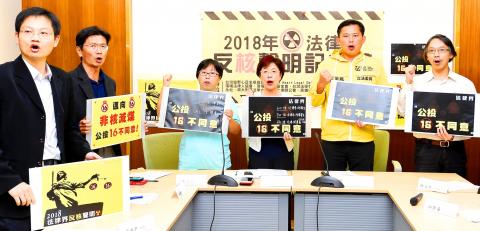More than 280 law practitioners yesterday launched a petition against a referendum to scrap the policy for a nuclear-free homeland by 2025, a gesture echoing another petition organized last week by more than 500 academics.
The referendum, initiated by Nuclear Myth Busters founder Huang Shih-hsiu (黃士修), asks if people agree to abolish Article 95-1 of the Electricity Act (電業法), which stipulates that all nuclear power generation facilities should stop operations by 2025.
It is one of 10 referendums to be held alongside the nine-in-one local elections on Saturday.

Photo: Chu Pei-hsiung, Taipei Times
As of yesterday morning, the petition had gathered 283 signatures from 121 lawyers, 46 law academics and more than 100 law students and law practitioners, the Wild at Heart Legal Defense Association said.
The 2002 Basic Environment Act (環境基本法) stipulates that the government must propose plans to make Taiwan nuclear-free, but the 2025 timeframe was last year written into the Electricity Act, association lawyer Tsai Ya-yin (蔡雅瀅) said, adding that no delay should be allowed.
New Power Party Executive Chairman Huang Kuo-chang (黃國昌); Democratic Progressive Party lawmakers Yu Mei-nu (尤美女) and Chou Chun-mi (周春米); as well as members of the Environmental Rights Foundation, the Taiwan Law Society and National Taiwan University’s Policy and Law Center for Environmental Sustainability also signed the petition.
Huang, who on Friday last week represented opponents in a televised debate with referendum advocate Liao Yen-peng (廖彥朋), said that voters should first answer the question: Where should nuclear waste — especially highly radioactive waste — be stored?
Scientists raised the question more than four decades ago when more nuclear power plants were being constructed, but even the groups trusted by nuclear power supporters — Taiwan Power Co (Taipower) and the Atomic Energy Council — have yet to propose any waste disposal solutions, he said.
Even if the referendum is passed, the Fourth Nuclear Power Plant in New Taipei City’s Gongliao District (貢寮), which was again mothballed in 2015 before construction was complete, could not be immediately started, Huang added.
According to council regulations, a proposal to update a nuclear power generator’s operating permit should be filed five to 15 years before the permit expires, Environmental Jurists Association chairman Chang Yu-yin (張譽尹) said.
Of the nation’s six nuclear power generators at three operating plants, only the permits for the two units at Pingtung County’s Ma-anshan Nuclear Power Plant could be extended within the given timeframe, as they expire on July 26, 2024, and May 17, 2025, Chang said, adding that it was too late to extend the permits for New Taipei City’s Jinshan plant in Shihmen District (石門) and the Guosheng plant in Wanli District (萬里).

The Ministry of Economic Affairs has fined Taobao NT$1.2 million (US$36,900) for advertisements that exceeded its approved business scope and ordered the Chinese e-commerce platform to make corrections in the first half of this year or its license would be revoked. Lawmakers have called for stricter supervision of Chinese e-commerce platforms and more stringent measures to prevent China from laundering its goods through Taiwan as US President Donald Trump’s administration cracks down on origin laundering. The legislature’s Finance Committee yesterday met to discuss policies to prevent China from dumping goods in Taiwan, inviting government agencies to report on the matter. Democratic Progressive Party

Taiwan and its Pacific ally Tuvalu on Tuesday signed two accords aimed at facilitating bilateral cooperation on labor affairs, according to Taiwan’s Ministry of Foreign Affairs (MOFA). The governments inked two agreements in Taipei, witnessed by Foreign Minister Lin Chia-lung (林佳龍) and visiting Deputy Tuvaluan Prime Minister Panapasi Nelesone, MOFA said in a news release. According to MOFA, the agreements will facilitate cooperation on labor issues and allow the two sides to mutually recognize seafarers’ certificates and related training. Taiwan would also continue to collaborate with Tuvalu across various fields to promote economic prosperity as well as the well-being of their

The Taipei District Prosecutors’ Office has continued its investigation into allegations of forged signatures in recall efforts today by searching the Chinese Nationalist Party’s (KMT) city chapter and questioning several personnel including the chapter director, according to media reports. Among those questioned and detained were KMT Taipei chapter director Huang Lu Chin-ju (黃呂錦茹), chapter secretary-general Chu Wen-ching (初文卿), chapter secretary Yao Fu-wen (姚富文) and first district committee executive director Tseng Fan-chuan (曾繁川). Prosecutors said they would not confirm reports about who had been summoned. The investigation centers on allegations that the ongoing recall campaigns targeting Democratic Progressive Party legislators Rosalia Wu (吳思瑤)

Several Chinese Nationalist Party (KMT) officials including Chairman Eric Chu (朱立倫) are to be summoned for questioning and then transferred to prosecutors for holding an illegal assembly in Taipei last night, the Taipei Police said today. Chu and two others hosted an illegal assembly and are to be requested to explain their actions, the Taipei City Police Department's Zhongzheng (中正) First Precinct said, referring to a protest held after Huang Lu Chin-ju (黃呂錦茹), KMT Taipei's chapter director, and several other KMT staffers were questioned for alleged signature forgery in recall petitions against Democratic Progressive Party (DPP) legislators. Taipei prosecutors had filed